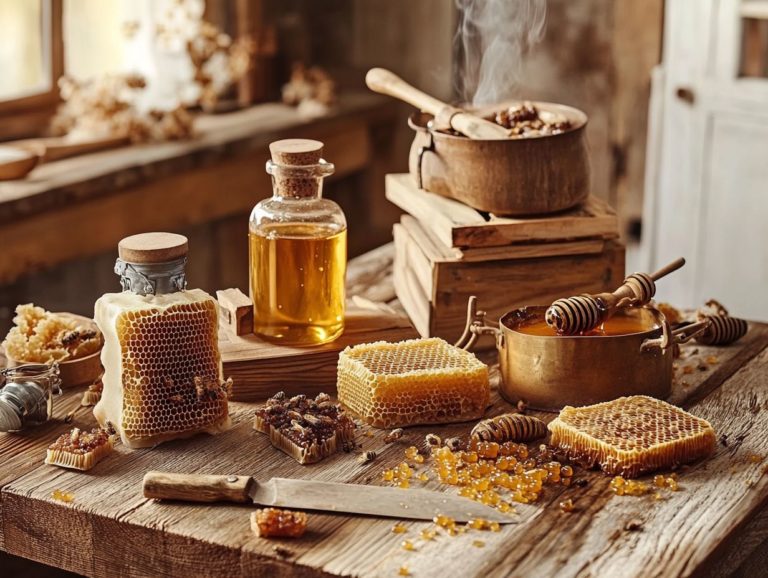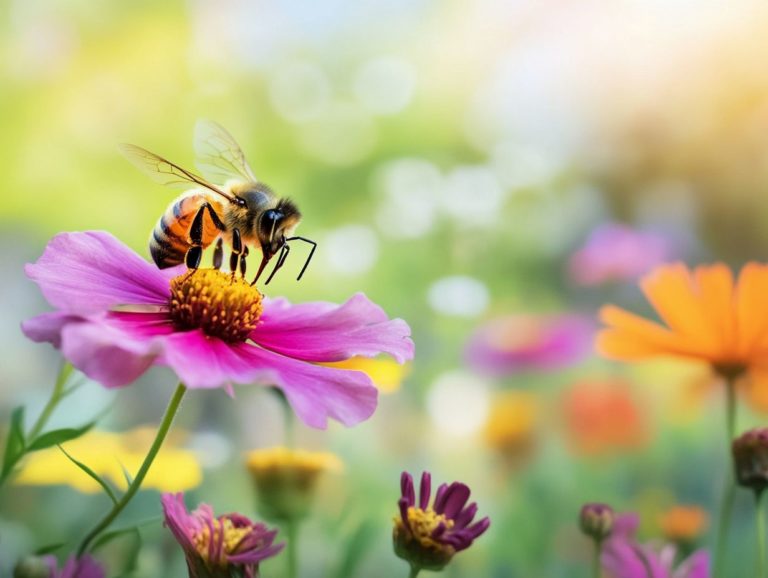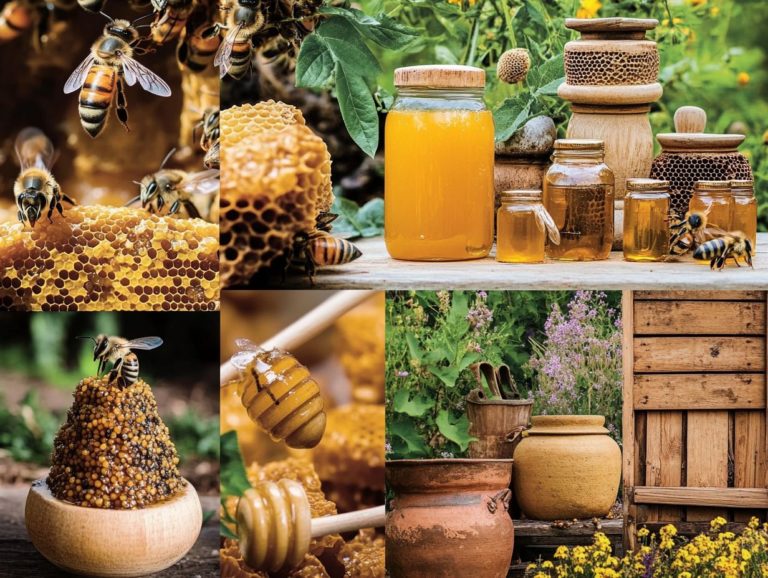How Honey Production Affects Local Economies
Honey production transcends the simple act of creating a sweet treat; it serves as a cornerstone for enhancing local economies, generating employment, and helping local businesses grow. It is also central to the overall honey industry, contributing significantly to economic output and the vitality of pollinator populations.
This intricate interplay resonates deeply within the realms of agriculture and environmental sustainability.
However, it also brings forth challenges, ethical dilemmas, and agricultural issues that need to be addressed.
By grasping these dynamics, you’ll see just how crucial it is to support sustainable and ethical honey production in your community, and understand its profound economic impacts.
Contents
- Key Takeaways:
- What is Honey Production?
- The Importance of Honey Production for Local Economies
- The Impact of Honey Production on the Environment
- Challenges and Controversies Surrounding Honey Production
- How Can Local Economies Support Sustainable and Ethical Honey Production?
- Frequently Asked Questions
- How does honey production impact local economies?
- What are some economic benefits of honey production?
- Does honey production have any environmental benefits?
- How does honey production support small businesses?
- What is the role of beekeeping in honey production?
- How can consumers support local economies through honey production?
Key Takeaways:
- Honey production has a positive impact on local economies by creating jobs, boosting agriculture, supporting small businesses, and contributing to the overall economic value of the community.
- Honey production also has environmental benefits, such as promoting bee populations, including honey bees and native pollinators, and providing natural pest control.
- Challenges and controversies surrounding honey production, such as sustainability and ethical concerns, can be addressed by supporting local producers and promoting sustainable practices.
What is Honey Production?
Honey production stands as a vital agricultural endeavor, involving the careful cultivation and harvesting of honey derived primarily from honey bees, along with a selection of native bees like bumble bees. This intricate process not only results in the creation of honey, a highly prized food product, but also significantly contributes to essential pollination services, which means helping plants reproduce so they can produce fruits and vegetables, for a wide array of food crops, including almonds and other economically important crops.
By enhancing food security and bolstering the economic significance of the agricultural sector, honey production plays an critical role in sustaining both local and global food systems. It also boosts the economic output and supports the broader food industry.
The Importance of Honey Production for Local Economies
Honey production plays a pivotal role in bolstering local economies, offering employment opportunities, stimulating economic activity, and generating essential income for communities involved in beekeeping and honey production.
The economic significance of this sector is immense, as it nurtures small businesses, enhances food security, and fosters collaborative efforts between local farmers and commercial beekeepers.
By engaging with this vibrant industry, you contribute to a thriving ecosystem that benefits everyone involved.
How Does Honey Production Create Jobs and Support Economic Sustainability?
Honey production is more than just a sweet endeavor; it creates a web of job opportunities across various sectors, including agriculture, processing, and retail. This multifaceted industry has a significant impact on local economies and supports the livelihoods of countless individuals involved in beekeeping and related industries, including economic sustainability and job creation within the food industry.
Consider the skilled beekeepers who diligently manage hives and ensure the health of bee colonies; their expertise is vital to the entire operation. Those overseeing the extraction and bottling of honey also play a crucial role in this intricate process. Then there are the marketing and distribution teams, working tirelessly to promote honey and related products to consumers, showcasing the unique attributes of local varieties. Additionally, public-private partnerships and research grants help support these efforts.
This seamless collaboration not only enhances the availability of honey products but also fosters economic growth in rural areas, providing sustainable income for families and giving a boost to local businesses. As honey production flourishes, it strengthens community ties and encourages sustainable agricultural practices, making a meaningful contribution to both the economy and the environment. The economic contribution of this industry plays a significant role in the overall U.S. GDP.
How Does Honey Production Boost Local Agriculture?
Honey production significantly enhances local agriculture by providing essential pollination services that elevate both the yield and quality of food crops. This mutual benefit contributes to the overall economic vitality of the agricultural sector.
Bees are the unsung heroes of this ecosystem. They pollinate approximately one-third of the food consumed globally. As they transfer pollen from one flower to another, they facilitate the growth of a diverse array of crops, including fruits, vegetables, and nuts. This vital interaction transforms our food system by boosting the quantity of produce and enriching its nutritional profile.
As a result, farmers often experience a remarkable increase in their harvests, leading to higher income and a more stable local economy. Supporting pollinator health and biodiversity is crucial to maintaining this positive impact.
To sustain these benefits, it is imperative to prioritize sustainable agricultural practices and the health of bee populations. This shows just how closely honey production and local farming are linked. Supporting pollinator habitat and natural forage areas can also mitigate issues like habitat loss and biodiversity loss.
How Does Honey Production Support Small Businesses?
Honey production plays a vital role in supporting small businesses, creating opportunities for local entrepreneurs in the beekeeping and honey-related industries. This drives economic activity and fosters sustainability within local economies.
As the trend for organic and locally sourced products continues to grow, the demand for artisanal honey has surged. This shift allows commercial beekeepers to tap into both niche markets and a broader consumer base. These dedicated producers collaborate closely with local farmers, enhancing pollination services and boosting crop yields.
Stimulating demand for these products boosts the overall economy. Local honey producers not only enrich regional economies but also help to preserve traditional practices and promote biodiversity. Through farmers’ markets and community-supported agriculture programs, these small businesses cultivate a loyal customer base.
Their efforts can also be supported by organizations such as the National Honey Board and USDA through research grants and public education initiatives. This reinforces the concept that when communities rally around each other’s enterprises, everyone reaps the rewards of a thriving local economy.
The Impact of Honey Production on the Environment
The impact of honey production on the environment is truly profound. It sustains honey bee populations and plays a crucial role in supporting overall environmental health and biodiversity, including the conservation of native pollinators such as the Monarch butterfly.
By providing natural forage and habitats that are essential for pollinators, honey production fosters a thriving ecosystem that benefits all. Programs such as the conservation reserve program play a critical role in maintaining these essential habitats.
How Does Honey Production Affect Bee Populations?
Honey production can profoundly impact bee populations, particularly honey bees, by influencing their health and viability. This, in turn, affects the overall well-being of native pollinators and contributes to colony loss, which has widespread economic impacts.
The practices engaged in while beekeeping, such as monoculture farming (growing only one type of crop) and the excessive application of chemical pesticides, can create an environment that jeopardizes these essential insects. Factors like habitat destruction, nutritional stress, and the spread of diseases and viral agents due to intensive management techniques exacerbate the challenges bees face.
Many people may not realize that exposure to certain pesticides has been linked to impaired foraging abilities and increased mortality rates in bee colonies. This highlights the pressing need to adopt more sustainable and bee-friendly practices in honey production.
By doing so, individuals can support pollinator health and ensure that these vital creatures thrive, continuing their crucial role in our ecosystem. Addressing issues like pesticide exposure and habitat loss through collaborative efforts and public education can further support this goal.
What Are the Environmental Benefits of Honey Production?
Honey production offers amazing environmental benefits. It provides vital pollination that boosts biodiversity and supports healthy ecosystems. These advantages extend to broader conservation efforts for species like the Monarch butterfly and other native pollinators.
Honeybees and other pollinators are essential for the reproduction of many flowering plants. They create habitats and food sources for a wide array of wildlife. By nurturing these pollinators through sustainable beekeeping practices, you contribute to the resilience of agricultural systems and natural landscapes alike. This effort supports the economic importance of maintaining pollinator populations for future generations.
Thriving honeybee populations clearly indicate a healthy ecosystem, showing that the surrounding environment is well-maintained. Through responsible honey production, you help preserve the delicate interactions within food webs, ensuring that future generations can enjoy a rich tapestry of biodiversity essential for both ecological integrity and human well-being. Active participation in conservation programs also helps mitigate biodiversity loss and supports ecosystem health.
Challenges and Controversies Surrounding Honey Production
Honey production faces many challenges that you should know about. From sustainability issues to ethical dilemmas, certain practices can lead to colony loss and expose bees to harmful pesticides. These concerns attract the scrutiny of environmental protection agencies.
The increased loss of bee populations due to these factors can have substantial economic impacts on the agricultural sector and food industry. Understanding these complexities is crucial for everyone involved!
Is Honey Production Sustainable?
Is honey production sustainable? Finding a balance between making money and protecting the environment is key. This balance is essential to prevent colony collapse and ensure the long-term vitality of bee populations. Public education and support from institutions like the Environmental Protection Agency and the USDA are crucial in addressing these concerns.
Farmers and producers are increasingly embracing sustainable practices that prioritize the well-being of pollinators. Methods like organic farming and integrated pest management strategies that safely control pests are becoming more common. These approaches not only protect ecological balance but also enhance the quality of honey, appealing to consumers who appreciate ethically produced goods.
By investing in diverse floral landscapes, you ll foster healthy bees with plentiful foraging opportunities. These are vital for hive productivity and resilience. Embracing sustainability in the honey industry allows you to secure economic stability while positively impacting ecosystem health, creating a beneficial cycle for both the bees and the agricultural community.
What Are the Ethical Concerns with Honey Production?
When considering honey production, you can t overlook the ethical concerns regarding the welfare of bees. Issues like colony loss and pesticide exposure are serious matters that significantly impact pollinator health and well-being.
These ethical dilemmas also arise during honey extraction. When methods prioritize yield over the safety of bees, it can lead to heightened stress and disruptions within the hive. Many industrial beekeeping operations may resort to techniques that ignore the natural behaviors of bee colonies, potentially contributing to a decline in overall bee populations.
Advocates for sustainable practices emphasize that addressing these issues is crucial not just for the well-being of the bees, but also for the vital role they play in global ecosystems through pollination. By understanding the implications of such practices, you can drive both consumers and producers toward more humane and responsible approaches to honey production.
How Can Local Economies Support Sustainable and Ethical Honey Production?
Local economies can significantly influence the support of sustainable and ethical honey production. By fostering initiatives that promote public education, encouraging collaboration, and providing incentives, you empower local beekeepers to adopt sustainable practices.
This approach not only enhances the quality of honey but also nurtures the community and environment.
Supporting Local Beekeepers and Honey Producers
Supporting local beekeepers and honey producers is vital for supporting local jobs and businesses within your community and ensuring sustainable honey production practices.
When you rally behind these local artisans, you’re not just helping to preserve traditional beekeeping methods; you’re also creating a ripple effect that benefits the entire local economy.
Participating in initiatives like farmers’ markets and cooperative selling platforms allows you to purchase honey directly from the producers, fostering a deeper sense of connection and trust. Awareness campaigns further educate the public about the crucial role of pollinators in agriculture, inspiring support for the beekeeping industry.
Engaging in honey-tasting events and workshops can provide valuable insights into how these small businesses contribute to preserving environmental health. This active involvement not only enhances community pride but also strengthens resilience in the face of change.
Promoting Sustainable and Ethical Practices
Promoting sustainable and ethical practices in honey production is essential for ensuring the long-term health of bee populations and the environment. This mission requires your active engagement in public education and collaboration with regulatory bodies like the Environmental Protection Agency.
To make a real impact, you must engage beekeepers, consumers, and policymakers in meaningful discussions about the importance of the variety of plant and animal life and the vital ecological roles that bees play. By increasing awareness through workshops, community events, and informative educational materials, you empower consumers to make informed choices that support responsible honey sourcing.
Advocating for policies that promote organic farming, limit pesticide use, and protect natural habitats is vital for fostering an environment conducive to bee health. By championing sustainable practices, you can actively shape a stronger, healthier ecosystem that not only benefits bees but also aligns with broader environmental goals centered on sustainability and conservation.
Frequently Asked Questions
Here are some common questions about the impact of honey production on local economies.
How does honey production impact local economies?
Honey production can have a significant impact on local economies by providing job opportunities, boosting tourism, and supporting small businesses.
What are some economic benefits of honey production?
Honey production can bring in revenue for local communities through the sale of honey and other bee-related products, such as beeswax and propolis. Propolis is a substance bees make to protect their hives.
Does honey production have any environmental benefits?
Yes, honey production supports the health of local ecosystems by promoting pollination and biodiversity, which can positively impact agricultural production.
How does honey production support small businesses?
Many small businesses, such as beekeepers, honey processors, and beekeeping supply companies, rely on honey production for their livelihood and contribute to the local economy.
What is the role of beekeeping in honey production?
Beekeeping plays a crucial role in honey production by managing and maintaining beehives, which are essential for honey production and pollination of crops.
How can consumers support local economies through honey production?
Consumers can support their local economies by purchasing honey and other bee-related products from local beekeepers and small businesses, contributing to the growth and sustainability of the industry.



